Garage rock is a raw and energetic style of rock music that flourished in the mid-1960s, most notably in the United States and Canada, and has experienced a series of subsequent revivals. The style is characterized by basic chord structures played on electric guitars and other instruments, sometimes distorted through a fuzzbox, as well as often unsophisticated and occasionally aggressive lyrics and delivery. Its name derives from the perception that groups were often made up of young amateurs who rehearsed in the family garage, although many were professional.

Nuggets: Original Artyfacts from the First Psychedelic Era is a compilation album of American psychedelic and garage rock singles that were released during the mid-to-late 1960s. It was created by Lenny Kaye, who was a writer and clerk at the Village Oldies record shop in New York. He would later become the lead guitarist for the Patti Smith Group. Kaye produced Nuggets under the supervision of Elektra Records founder Jac Holzman. Kaye conceived the project as a series of roughly eight LP installments focusing on different US regions, but Elektra convinced him that one double album would be more commercially viable. It was released on LP by Elektra in 1972 with liner notes by Kaye that contained one of the first uses of the term "punk rock". It was reissued with a new cover design by Sire Records in 1976. In the 1980s, Rhino Records issued Nuggets in a series of fifteen installments, and in 1998 as a 4-cd box set.

The Seeds are an American psychedelic garage rock band that formed in Los Angeles, California in 1965, best known for their highest-charting single "Pushin' Too Hard". The band's classic line-up featured frontman Sky Saxon, guitarist Jan Savage, keyboardist Daryl Hooper and drummer Rick Andridge. In 1968, the band changed their name to Sky Saxon and the Seeds, with Savage and Andridge departing the band. They went on to release a handful of additional singles.

The Brogues were an American garage rock band formed in Merced, California, in 1964. Much of the group's brief recording career was marked by distorted-guitar melodies and R&B-influenced vocals. They released two regionally successful singles in their brief existence, most notably the Annette Tucker and Nancie Mantz-penned "I Ain't No Miracle Worker", which is now considered a classic of the garage rock genre. The song has also appeared on several compilation albums and has been covered by other music artists.

Sky "Sunlight" Saxon was an American rock and roll musician best known as the leader and singer of the 1960s Los Angeles psychedelic garage rock band The Seeds.

The Psychedelic Sounds of the 13th Floor Elevators is the debut studio album by the 13th Floor Elevators. The album's sound, featuring elements of psychedelia, hard rock, garage rock, folk, and blues, is notable for its use of the electric jug, as featured on the band's only hit, "You're Gonna Miss Me", which reached number 55 on the Billboard Hot 100 with "Tried to Hide" as a B-side. Another single from the album, "Reverberation (Doubt)", reached number 129 on the Billboard's Bubbling Under chart.

The Remains were a mid-1960s American garage rock group from Boston, Massachusetts, led by Barry Tashian. Although the Remains never achieved national success, they were very popular in New England, and were one of the opening acts on the Beatles' final US tour in 1966.
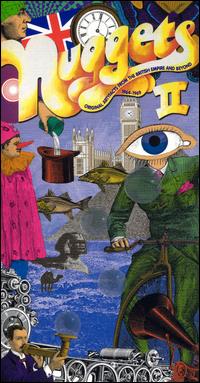
Nuggets II: Original Artyfacts from the British Empire and Beyond, 1964–1969 is a four-disc box set from Rhino Records, released in 2001.
Mouse and the Traps was the name of an American garage rock band from Tyler, Texas, United States, that released numerous singles between 1965 and 1969, two of which, "A Public Execution" and "Sometimes You Just Can't Win", became large regional hits. The leader of the band, nicknamed "Mouse", was Ronny Weiss. Two of their best known songs, "A Public Execution" and a cover of "Psychotic Reaction", are not actually credited to this band but, respectively, to simply Mouse and Positively 13 O'Clock instead. Their tangled history also included one single that was released anonymously under the name Chris St. John. The band are not to be confused with the girl group Mousie and The Traps who recorded for Toddlin' Town records around the same time.
Nuggets is a series of compilation albums, started by Elektra Records in 1972 and continued by Rhino Records thereafter. The series focuses primarily on relatively obscure garage and psychedelic rock songs from the 1960s, but with some hits and pop-oriented songs also included.
Robert "Bobby" Winkelman was an American singer, song writer, rhythm guitarist, and bass guitarist. He was a founding member of the East Bay band The Epics.

Mark Shalom Tulin was an American bass guitarist who played with the psychedelic rock band The Electric Prunes.
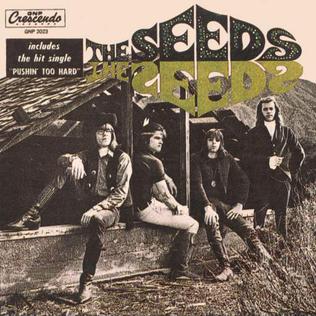
The Seeds is the debut album by American garage rock band the Seeds. It was released in April 1966 through GNP Crescendo Records and produced by Sky Saxon. After the release of two singles in 1965, "Can't Seem to Make You Mine" and "Pushin' Too Hard", the album was released and charted in the United States where it peaked at No. 132 on the Billboard Top LPs & Tapes chart. Modern reception of the album is positive, with Malcolm Russel noting the band's influence on CBGB musicians a decade later.

"Pushin' Too Hard", originally titled "You're Pushing Too Hard", is a song by American rock group The Seeds, written by vocalist Sky Saxon and produced by Saxon with Marcus Tybalt. It was released as a single in 1965, re-issued the following year, and peaked at number 36 on the Hot 100 in February 1967 and number 44 in Canada in March.

"Mr. Farmer" is a song by American garage rock group The Seeds, written by vocalist Sky Saxon and produced by Marcus Tybalt. It was released as a single in 1967 and peaked at number 86 on the U.S. Billboard Hot 100 chart. The song was banned on many radio stations during the time of its release because of its drug references.
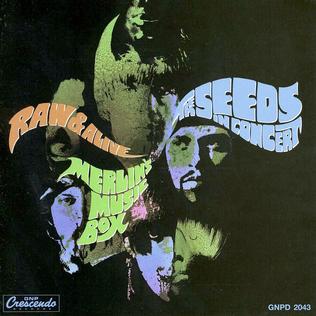
Raw & Alive: The Seeds in Concert at Merlin's Music Box is the fifth album by the American garage rock band, the Seeds, and was released on GNP Crescendo in May 1968. It was marketed as a live album, and actually was recorded raw, but all of the album's contents were completed in a studio. The album marks a return to the band's energetic punk sound that previously garnered them national acclaim. Upon release, however, the album, and its accompanying single, "Satisfy You", failed to chart, and the group would eventually disband in 1972.
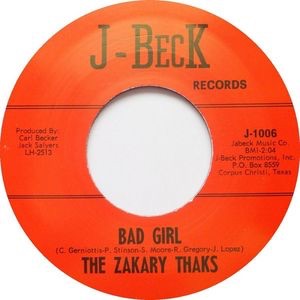
"Bad Girl" is a song by the American garage rock band the Zakary Thaks, written by the whole group—Chris Gerniottis, Pete Stinson, Stan Moore, Rex Gregory, and John Lopez—and was first released for the band's debut single on J-Beck Records in July 1966. The song was an immensely successful regional hit in Texas, precipitating "Bad Girl"'s national release on Mercury Records later in the year. Since its initial distribution, the tune has received further recognition for its appearance on several compilation albums.

The Underdogs were an American garage rock band from Grosse Pointe, Michigan who were active in the 1960s. They became a regular attraction at the Hideout, a club that was an early venue for acts such as Bob Seger, Glenn Frey, and The Pleasure Seekers, featuring Suzi Quatro, and it also served as the home to the Hideout record label, which released several of the Underdogs' singles. The group enjoyed success in the region and came close to breaking nationally with two records released through a joint deal on Reprise Records and then their last on Motown. The Underdogs' work has been included on various garage rock compilations such as the 1998 Nuggets 4-CD box set released on Rhino Records.
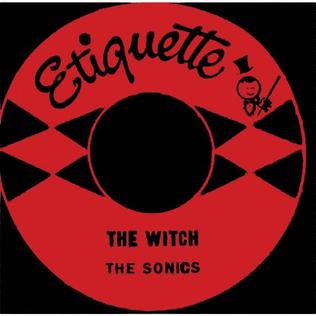
"The Witch" is a song by the American garage rock band the Sonics, written by vocalist Gerry Roslie, and first released as the group's debut single in November 1964. It also appears on the Sonics' debut album Here Are the Sonics!!!. Among the most frantic and heaviest rock recordings of the era, "The Witch" is regarded as being a quintessential stepping stone in the development of punk rock despite the fact the tune never reached national success. Since the song's original release, "The Witch" has appeared on numerous compilation albums, most notably the 1998 reissue of Nuggets: Original Artyfacts from the First Psychedelic Era, 1965–1968.
Alejandro "Alec" Palao is a British musician, music historian, writer, and reissue producer. In addition to his musical output with groups like the Sting-rays, the Sneetches, and Mushroom, his works include hundreds of production credits and liner notes on important compilations of vintage rock and soul from Ace Records, Rhino Records, and others, plus a wide array of music-related print and film credits. Palao is unusual in that he normally supervises each aspect of the projects he compiles, including audio transfers and restoration as well as research and liner notes. Honors include five Grammy Award nominations for historical albums and liner notes.















